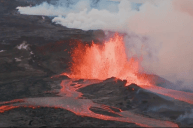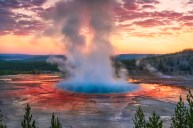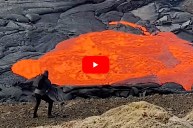An active weekend beneath Hawaii's Kilauea volcano has many wondering if it is set to erupt any time soon. The Kilauea volcano, one of the world's most active, sits inside Hawaii's Volcano National Park.
According to the NY Post, hundreds of earthquakes were detected under Kilauea's upper East Rift Zone over the weekend. While an increase in seismic activity can act as a forewarning of an impending eruption, geologists from the U.S. Geological Survey have stated that it is still hard to predict when Kilauea could experience its next eruption.
Kilauea last erupted on June 3rd from its southwest summit. The eruption was the first to take place in the southwest summit in about 50 years, and lasted several days.
Kilauea, one of the world's most active volcanoes, is living up to its reputation after more than 500 earthquakes were identified under the upper East Rift Zone, and its surrounding areas between Saturday and Sunday.
Hundreds of Earthquakes Have Eyes Turned to Kilauea
While the official statements from the U.S. Geological Survey seem to cool some of the concern building around the sudden uptick in seismic activity at Kilauea, it is still hard to ignore the volcano's most recent eruption, and feelings that another may be looming.
If an eruption were to follow the hundreds of earthquakes that were recorded over the weekend, it would not be the first in the area. According to the U.S. Geological Survey's Hawaiian Volcano Observatory, the upper East Rift Zone last experienced eruptive activity in November 1979, near the Puahi Crater.
With such activity over the weekend, experts heed caution regarding Kilauea. The Volcano Alert Level at Kilauea remains advisory for ground impacts, while the aviation alert-level coded is yellow, both indicating elevated activity at the volcano.
As things stand now, the USGS remains steadfast that Kilauea is not erupting. The sudden increase in seismic activity can not be used to effectively predict when the volcano could erupt next.
By Sunday morning, the USGS HVO reported that the seismic activity at Kilauea had eased "slightly" from the night before. Saturday night, the activity had peaked at roughly 30 seismic events an hour.




